In the modern day cricket era, we have been lucky to witness some very young and immensely talented cricketers who shone throughout their careers and entertained the fraternity in their own unique ways.Some of them came through the ranks of disciplined, textbook cricket and served their nations with their solid and secure presence on the field, while others took the game to another level by their sheer aggressive approach and audacity to play the game like no one else had played before.Expectedly, after the success they achieved, quite a few of these cricketers were eventually given the command of leading their national teams, which to some came naturally, while others with dogged determination worked harder, at times out of their makeup, to match the expectations of millions of fans.Quite a lot of them made it till the end of the journey, enjoying success and failures on the way and eventually passing the torch to the next generation. Some however, due to various complexities of the game and what it does to them, relieved themselves from the leadership role and in some cases, from the game itself right when we thought that they will be in the ring for a few more rounds.Let’s have a brief look at 5 of such modern era Test cricket Legends, who either resigned from captaincy and/or left the game just when we thought that they still have a few years left in them.
#1 Michael Clarke
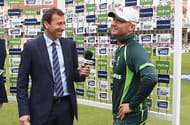
Australian Test captain Michael Clarke’s retirement announcement is still very fresh in our memories and making rounds in the media all around the world. When Australia landed in England, no one would have given it a thought. The Australian captain and his team were as bullish as they always have been. In fact, it was England who started as the underdogs this Ashes series (2015).
Less than a month later, England regained the Ashes with a thumping win over their arch rivals in the 4th Test – winning by an innings and 78 runs at Trent Bridge.
Certain talks about Clarke’s career coming to an end had been doing the rounds since the 3rd Test match of the series. He, however, came out hitting back at the critics and media, post Australia’s defeat in the 3rd Test match, raring to go and declaring that he has so much cricket still left in him. Until now, he is averaging only 16 from 8 innings this Ashes series.
His overall captaincy record currently stands at 23 wins and 16 losses from 46 Test matches and he will be leading the Australian team for one last time during the last Ashes Test match.
He is just 34 and many would argue that he had another 2 years at least left in him. The classy Australian right-hander played 114 Tests, scoring 8, 628 runs at an average of 49.30. He scored 28 hundreds and 27 fifties. His record validates his undeniable talent.
Australia’s fourth successive Ashes loss away from home, which was their worst sequence of results in England since 1896, in addition to his diminishing batting form (since March 2014, the captain's last 18 innings have produced 388 runs.) might have played a crucial role in the retirement decision.
He will be remembered as a great Australian batsman and Australia’s 5-0 thrashing of England in the 2013 Ashes along with 2015 cricket World Cup triumph will be noted as the highest points of his career as a Captain.
#2 Mahendra Singh Dhoni
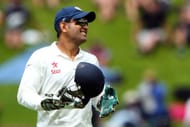
Mahendra Singh Dhoni has been undoubtedly one of the most influential leaders in Indian Cricket history, winning the ICC World Twenty20 in 2007 and the Cricket World Cup in 2011.
With respect to his captaincy in Test cricket, he shocked the world when he announced his retirement from the longer format during India’s tour to Australia in December 2014. He did it after the third Test (which was drawn) of the series which India had already lost (losing the first two Test matches). Dhoni was 33 then.
He led India in 60 Test matches, winning 27 of them, losing 18 and drawing 15. His batting record in Tests stood at 4,876 runs from 90 matches, with 6 centuries, 33 fifties and an average of 38.09. Dhoni scored 3,454 runs as Test captain – the most by any Indian captain, overtaking Sunil Gavaskar's record of 3,449 on his final day of Test cricket. He also took 256 catches and 38 stumpings in his career.
His highest point as India’s Test captain was when he led India to the number 1 ranking in 2009.
His record outside the subcontinent is not as impressive though. His batting average outside the subcontinent was 29.79. As captain, he won only 6/30 Test matches outside India. After India’s back to back away series defeats in Australia and England, he faced criticism for his Test captaincy from India as well as outside.
#3 Graeme Smith
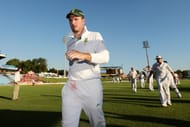
Graeme Smith announced his retirement from all forms of international cricket during the Test series against Australia in South Africa. He was only 33 then, but with a huge experience of 116 Tests, 109 of which as captain of South Africa.
Quoting the ankle injury as one of the main reasons behind the decision, he said “It's a decision I've been considering since my ankle surgery in April. I have a young family to consider”
He scored 9,265 runs at an average of 48.25 and finished second on the list of South Africa’s top scorers. He scored 27 hundreds (none of which resulted in defeat)
He was given captaincy at an early age of 22. In his very first tour (2003) as Test captain to England, he scored a double hundred in the first and second Tests. In 2012, South Africa was the number one team in the world. He will be remembered for leading South Africa to a series win in Australia, during which he came out to bat with a broken hand in Sydney. Another feather in his cap was South Africa's formidable record in the subcontinent.
Haroon Lorgat, the then Cricket South Africa chief executive said "I would like us to remember Graeme for his nerves of steel and his match-winning performances that were synonymous with some of the most remarkable fourth innings victory chases of all time. These included setting up the 414 runs chase against Australia at Perth and his series-clinching innings at Edgbaston in 2008, not to mention the unbeaten century the last time he faced Australia at Newlands in 2011. His role in setting up the famous 438 win over Australia in 2006 was also a performance never to be forgotten.”
#4 Rahul Dravid
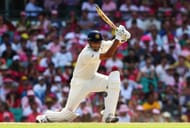
Rahul Dravid, who made his debut for the Indian cricket team at Lord’s in 1996 scoring 95 and ended his career as one of the legends of the game, faced tough times with captaincy. His overall career as a batsman is next only to Sachin Tendulkar: 13,288 runs in 164 matches, with 36 hundreds at an average of 52.31.
He took over the captaincy from Sourav Ganguly and performed this role for around 2 years. In that period, he captained India for 20 Tests and 62 ODIs. Under his leadership, India won 8 Tests, highlight being the series wins in West Indies, Bangladesh and England. As Captain, he averaged 51 in Tests and 44 in ODIs.
His ODI Captaincy record was a bit of a mix; it began with India recording 16 consecutive successful chases, but first-round exit from the World Cup was the lowest point.
Ultimately, when he was 34, he resigned from captaincy to focus on his batting. This came shortly before the Australian series. His batting average went down during the series against England (25) and South Africa (21). He said “I enjoyed the captaincy, I loved it, but it can get tough after a while and some of the enjoyment can go away,"
When he resigned, he also requested the Indian Cricket Board not to consider him for ICC World Twenty20, which India won under their new leader – MS Dhoni.
#5 Kevin Pietersen
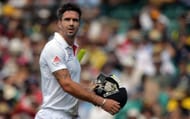
This South African-born English Player had one of the shortest stints as a captain of the national side. He led England in Tests and ODIs from 4th Aug 2008 to 7th Jan 2009 – three Test matches and nine ODIs. One of the key reasons cited for that at that time was a dispute he had with the then English coach Peter Moores.
Before this incident and otherwise, Pietersen enjoyed a legendary spell as an English Batsman. He was the fastest player to reach 4000, 5000 and 7000 runs in Test cricket. In July 2008, The Times called him “the most complete batsman in cricket”. In 2012, the Guardian called him “England’s greatest modern batsman”.
After enjoying such success, during the series against South Africa, he was awarded the captaincy after Michael Vaughan resigned due to his dip in form and England losing that Test Match.
In January 2009, after England’s loss to India, KP went public, mentioning an “unhealthy situation” in the England Camp, led by his and Coach Moore’s disagreement over various issues. On 7th January 2009, Moores was removed as England's coach by the ECB, and he unexpectedly resigned as captain.
Pietersen continued to play for England though and scored 8,181 runs in 104 Tests with an average of 47.28. His last contribution was 294 runs at an Average of 29 in the Ashes tour of 2013-2014 which England lost 5-0. Among the events after this disastrous series, he was not included in the next tour to West Indies and one of the reasons stated was his “nature of relationship” with the team management.
He released a statement which read "Although I am obviously very sad the incredible journey has come to an end, I'm also hugely proud of what we, as a team, have achieved over the past nine years."
Follow IPL Auction 2025 Live Updates, News & Biddings at Sportskeeda. Get the fastest updates on Mega-Auction and cricket news
